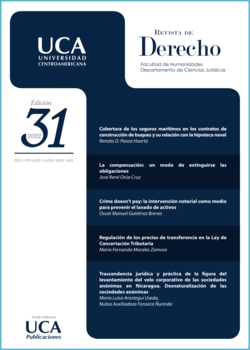Legal and practical significance of the lifting of the corporate veil of corporations in Nicaragua
Denaturation of corporations
DOI:
https://doi.org/10.5377/derecho.v20i31.13215Keywords:
Corporate veil, Final beneficiary, registration, obligated subjects, sanctionsAbstract
Historically, corporations have enjoyed the protection of the corporate veil, a figure that guarantees the anonymity of the identity of its partners, and therefore constitutes the main characteristic of his capitalist society however, this benefit has been used to carry out illicit businesses in the name of the legal entity. Circumstance that has forced several countries, including Nicaragua, to implement the registry of the final beneficiary, under recommendations No. 10, 22, 22, given by the Financial Action Task Force (FATF), so it is worth asking ourselves if this registry attempts against the legal nature of corporations, and what security it provides to companies on the safeguarding and handling of their information. This documentary research addresses these questions, because it has been developed to analyze the legal nature of corporations, the dogmatic basis of the corporate veil theory, and the legal-practical transcendence of its lifting through the obligation of reporting the final beneficiary. This obligation is necessary in view of the growing commercial and technological evolution, and also requires the Nicaraguan State to adequately safeguard the information provided by the partners through this registry.
Downloads
851
HTML (Español (España)) 3107
Published
How to Cite
Issue
Section
License
Copyright (c) 2021 Universidad Centroamericana (UCA)

This work is licensed under a Creative Commons Attribution-NonCommercial-ShareAlike 4.0 International License.
© Copyright Universidad Centroamericana (UCA)
The author undertakes not to submit any article to any other journal or publication simultaneously.The content of the research article is the sole responsibility of the author, as a result, the Law Journal is released from any responsibility derived from the content of the work.
The author assigns the Revista de Derecho, the right to publish the article, distribute it and market it in the way he considers convenient, nationally and internationally, in printed and electronic format;as well as its inclusion in directories, bibliographic bases and international indexes.

This work is licensed under a licencia de Creative Commons Reconocimiento-NoComercial-CompartirIgual 4.0.




